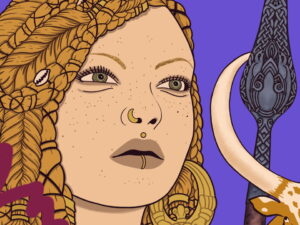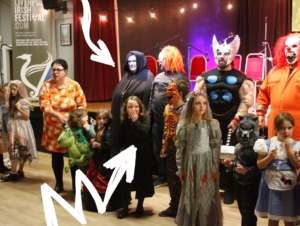
Festival friends will know that, since 2016, we’ve run a strand of work known as In:Visible Women.
Initially responding to #MeToo, and the unveiling of several institutional scandals, our programme has considered individuals, mixed-race families and folkloric goddesses. Along with many others, we started celebrating St Brigid’s Day (1 Feb) a few years ago. Since then, the Irish Government have awarded her a public holiday in Ireland, to be observed nationally from 2023. Each year, we tell stories of Irish women, because so many have been undocumented or remain in the shadow of male counterparts.
In the first of a series of three stories, to be revealed over the next six months, artist and storyteller Maria Crean unveils the story of another Irish female powerhouse. Myth or legend, there is no denying this Queen has left her mark in Irish folklore.
Queen Medb
Medb, later presented as Meadhbh, Méibh and Méabh is often anglicised as ‘Maeve’ or ‘Maev’. However, for the purposes of this story we’ll continue to use her original name.
Hurt and fortunes
Queen Medb of Connaught was a fierce, headstrong, Irish warrior best known for the cattle raid of Cooley and Cú Chulainn’s downfall. When Medb left her unhappy marriage, to King Conchubar of Ulster, her sister Eithne was offered as her replacement. Despite Medb’s dislike of Conchubar, this union sparked a jealous rage in her and she drowned her pregnant sister. However, the baby survived and was removed from Eithne’s body, an oversight Medb would later regret.
After Conchubar subjected Medb to a revengeful and humiliating assault at Tara, Medb’s hatred of Ulster -and its men- intensified. So determined was Medb to see Conchubar’s end that she re-named all her seven sons ‘Maine’; the name prophesied by a druid as the name of someone who would go on to kill Conchubar, when she asked the druid who would avenge her. Although ‘Maine’ would go on to kill a Conchubar, it was not the Conchubar Medb had had in mind.
Power and pride
Medb was not a woman to be messed with, and as Queen of Connaught, she had equality with her male leaders. After Conchubar, Medb found the qualities she desired in her husband Aillil – a lack of fear, meanness and jealousy. A jealous husband would have struggled by Medb’s side, as she was said to charm many men. It was rumoured no new leader could be crowned before spending the night with her. Medb’s name is etymologically related to the word for mead, and is said to mean ’she who intoxicates’.
Aillil was not without imperfection. He foolishly teased Medb about who was the more powerful of the two. Although fairly matched, Aillil had one thing over Medb: a magnificent white-horned bull. Medb could not bear this imbalance and immediately sought her own beast. Treasures untold were offered to the owner of a commensurate brown bull, but the offer was refused. Enraged, Medb assembled a large army to invade Ulster and pilfer the bull.
The Ulstermen were cursed at this time by the Goddess Macha. Macha had been forced to race against a horse while heavily pregnant, leading to the death of her twins. Following this she decreed that for nine days annually, the Ulstermen’s strength would leave them when they needed it most, reflecting the the agony of childbirth. Medb planned to use this to her advantage.
Cú Chulainn
The only remaining line of defence was young Cú Chulainn, who was immune to the curse. Cú Chulainn’s skills -however mythical- posed a realistic threat to Medb’s army. Medb spared no expense in convincing Connaught’s best warriors to fight, even promising the hand of her daughter Fiandabair to whichever warrior destroyed Cú Chulainn.
Such was this prize, that among those who attempted to kill Cú Chulainn’s, was his old and dear friend, Ferdiad. Despite embracing after each day’s battle, and sharing food, drink and healing herbs; Cú Chulainn knew that his friend would die by his hand. Ferdiad’s fate was sealed when on the third day, Cú Chulainn’s invincible spear -the Gae Bulg- soared through him. As a final act of affection, Cú Chulainn took his body back across the border so it did not lie with Medb’s men in the west.
Through the distraction of the fighting Medb eventually managed to smuggle out her bull, only for it to be gored to death by Aillil’s bull on arrival in Connaught.
Revenge
Medb did not easily forget Cú Chulainn’s assault against her men and plotted a long-drawn revenge. She fostered six children, orphaned by Cú Chulainn, and sent them to sorcery school. This charity was rewarded when the children returned, transformed as goblins, armed with three unconquerable enchanted spears. Filling Cú Chulainn’s head with paranoid sounds of war, he rushed to gather his weaponry and chariot. Many were suspicious that trickery was afoot and begged Cú Chulainn not to go, for they feared he would not return.
Cú Chulainn again raced towards Medb’s alarmed forces. At the critical moment Cú Chulainn’s enemy Lugaid hurled the spears. The first killed Cú Chulainn’s charioteer. The second, his horse. The final spear found its mark in Cú Chulainn’s side. In a dying act of defiance Cú Chulainn tied himself upright to a post facing his enemies. Too afraid to approach, they waited three days until a raven landed upon him, signifying that the mighty Cú Chulainn was now a mortal corpse.
Retribution
Medb’s own downfall came in later years as she bathed in her favourite pool on Lough Ree. Her nephew Furbaide had never forgotten his mother’s murder. He honed his slingshot skills until he knew could hit a mark from a distance as wide as the pool. The next time Furbaide saw his aunt swimming, he killed her with a piece of hardened cheese. Medb’s hostility towards the Ulstermen lingered even after death, when she was buried upright, to face her enemies.
We will release two new stories from Maria, complete with her illustrations in the next six months over on our website. Just search ‘Maria Crean’ to locate.




